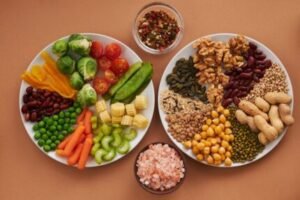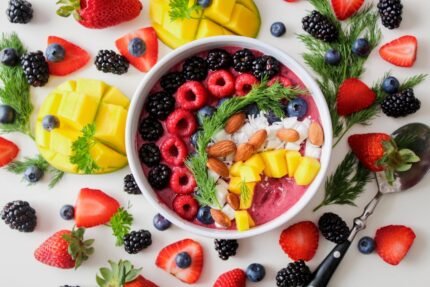Medically reviewed by Dr. Ramesh Gaddam, M.D. — Written by Sumalatha, D.N.H.E
Table of Contents
ToggleDid you know that melanin, the pigment responsible for your skin’s color, also plays a crucial role in protecting against UV radiation?
This natural shield is vital for skin health and appearance.
Understanding how to boost melanin production can lead to healthier skin.
In this post, we’ll explore various foods that can help increase melanin levels, enhancing your skin’s natural defense and radiance.
Discover the dietary choices that can make a difference in your skin’s health and glow.
1. What is Melanin?
Melanin is a natural pigment found in most organisms, responsible for the color of the skin, hair, and eyes.
It is produced by cells called melanocytes and plays a crucial role in protecting the skin from damage caused by UV radiation.
2. Types of Melanin

There are three main types of melanin, each serving distinct functions in the body:
Eumelanin:
This type of melanin is primarily responsible for black and brown colors in the hair, skin, and eyes.
It provides significant protection against UV radiation.
Pheomelanin:
Found in red and yellow hues, pheomelanin is abundant in individuals with lighter skin tones and red hair.
While it contributes to hair and skin color, it offers less UV protection compared to eumelanin.
Neuromelanin:
This type of melanin is found in the brain and is believed to play a role in protecting neurons, although its exact functions are still being researched.
3. Role of Melanin in the Body
Melanin serves several important functions beyond determining physical appearance.
Its presence and levels are influenced by various factors, including genetics, sun exposure, and nutrition.
Protection against UV Radiation
One of the primary roles of melanin is to protect the skin from harmful UV radiation.
By absorbing and dissipating UV rays, melanin helps prevent DNA damage, reducing the risk of skin cancer and other skin-related issues.
Determining Skin, Hair, and Eye Color
Melanin is the key determinant of skin, hair, and eye color.
Higher concentrations of eumelanin result in darker skin and hair, while lower levels lead to lighter colors.
Pheomelanin contributes to red and yellow hues in hair and skin, particularly in individuals with fair complexions.
4. Factors Affecting Melanin Production

Understanding the factors influencing melanin production can help you optimize your skin’s health and protection.
Genetics
Your genetic makeup plays a significant role in determining your baseline melanin levels and how your body responds to melanin production.
Sun Exposure
Exposure to sunlight stimulates melanocytes to produce more melanin, leading to tanning as a protective response.
Nutrition
Certain nutrients, such as copper, vitamin A, and tyrosine, are essential for melanin production.
A diet rich in these nutrients can support healthy melanin levels.
Understanding the factors that influence melanin production can help you take steps to maintain healthy skin and optimize your body’s natural defenses.
5. Nutrients Essential for Melanin Production
Nourishing your skin from within requires specific nutrients that are essential for boosting melanin production and maintaining skin health.

Copper
Copper is a crucial mineral in the melanin production process.
It acts as a cofactor for the enzyme tyrosinase, which is essential for converting the amino acid tyrosine into melanin.
Without adequate copper, the melanin synthesis pathway is significantly impaired.
Foods Rich in Copper:
- Shellfish (e.g., oysters, crab)
- Nuts (e.g., cashews, almonds)
- Seeds (e.g., sunflower seeds, sesame seeds)
- Liver (e.g., beef liver, chicken liver)
Vitamin A
Vitamin A plays a vital role in the health and function of skin cells, including melanocytes.
It helps regulate the production of melanin and ensures proper skin cell turnover, promoting a balanced skin tone.
Foods Rich in Vitamin A:
- Sweet potatoes
- Carrots
- Spinach
- Kale
- Butternut squash
Vitamin C
Vitamin C is a powerful antioxidant that supports melanin production by enhancing the activity of tyrosinase, the enzyme crucial for melanin synthesis.
It also helps protect skin cells from oxidative stress, promoting overall skin health.
Foods Rich in Vitamin C:
- Citrus fruits (e.g., oranges, lemons, grapefruits)
- Strawberries
- Bell peppers
- Kiwifruit
- Broccoli
Vitamin E
Vitamin E is another potent antioxidant that protects skin cells from damage.
It helps maintain healthy skin by reducing oxidative stress and inflammation, which can support the proper functioning of melanocytes and melanin production.
Foods Rich in Vitamin E:
- Almonds
- Sunflower seeds
- Avocados
- Spinach
- Olive oil
Tyrosine
Tyrosine is an amino acid that serves as a precursor in the melanin synthesis pathway.
It is converted into melanin through a series of enzymatic reactions, making it a fundamental building block for melanin production.
Foods High in Tyrosine:
- Soy products (e.g., tofu, soy milk)
- Poultry (e.g., chicken, turkey)
- Fish (e.g., salmon, cod)
- Dairy products (e.g., cheese, yogurt)
- Peanuts
Incorporating these nutrients into your diet can help support and enhance melanin production, leading to healthier skin with improved natural protection and radiance.
6. Foods That Boost Melanin Production
Boosting melanin production naturally can be achieved through a balanced diet rich in specific nutrients.
Certain foods are especially effective in promoting melanin synthesis, enhancing your skin’s natural protection and appearance.
Dark Leafy Greens

Dark leafy greens are packed with essential vitamins and minerals that support melanin production.
These greens are rich in vitamin A, vitamin C, and folic acid, which help maintain healthy skin and promote melanin synthesis.
- Examples: Spinach, kale, Swiss chard, collard greens
- Benefits: Enhance skin health, boost melanin production, and provide antioxidants to protect skin cells.
Fruits and Vegetables
A variety of fruits and vegetables contribute to melanin production due to their high content of vitamins and antioxidants.
Berries and citrus fruits are particularly beneficial because they are rich in vitamin C, which supports the activity of the enzyme tyrosinase in melanin synthesis.
- Examples: Blueberries, strawberries, oranges, lemons, bell peppers, tomatoes
- Benefits: Provide antioxidants, enhance collagen production, and support melanin synthesis for healthier skin.
Nuts and Seeds
Nuts and seeds are excellent sources of essential fatty acids, vitamins, and minerals, including copper and vitamin E.
These nutrients are crucial for maintaining healthy skin and supporting melanin production.
- Examples: Almonds, sunflower seeds, flaxseeds, chia seeds, cashews
- Benefits: Supply copper and vitamin E, protect skin cells from oxidative stress, and promote melanin synthesis.
Seafood
Seafood is rich in omega-3 fatty acids, selenium, zinc, and copper, all of which play vital roles in skin health and melanin production.
These nutrients help maintain the structural integrity of skin cells and support enzymatic processes involved in melanin synthesis.
- Examples: Salmon, oysters, mackerel, crab, shrimp
- Benefits: Provide essential fatty acids, minerals, and vitamins that support melanin production and skin health.
Whole Grains and Legumes
Whole grains and legumes are important sources of B vitamins, iron, and tyrosine, which are necessary for melanin production.
These foods support overall skin health and provide the building blocks needed for melanin synthesis.
- Examples: Quinoa, brown rice, lentils, chickpeas, black beans
- Benefits: Offer essential nutrients for melanin production, support skin cell health, and promote even skin tone.
Incorporating these foods into your diet can help boost melanin production, leading to healthier, more radiant skin.
7. Diet Tips to Boost Melanin Production
Given below are some of the tips for improving melanin production with the help of diet.
Balanced Diet
Maintaining a balanced diet is crucial for overall skin health and effective melanin production.
A diet rich in vitamins, minerals, and antioxidants supports the body’s natural processes, ensuring that melanocytes function optimally.
- Key Nutrients: Include foods high in copper, vitamins A, C, E, and tyrosine to boost melanin production.
- Diverse Diet: Incorporate a variety of fruits, vegetables, whole grains, nuts, seeds, and lean proteins.
Hydration
Proper hydration is essential for healthy skin and efficient melanin production.
Water helps maintain skin elasticity, aids in the transportation of nutrients to skin cells, and flushes out toxins.
- Daily Intake: Aim to drink at least 8 glasses of water a day.
- Hydrating Foods: Include water-rich foods like cucumbers, watermelon, and oranges.
Sun Exposure
Moderate sun exposure stimulates melanin production, enhancing the skin’s natural defense against UV rays.
However, it’s important to manage sun exposure to avoid skin damage.
- Time of Day: Opt for early morning or late afternoon sun when UV rays are less intense.
- Duration: Limit exposure to short periods (10-30 minutes) and gradually increase as tolerated.
- Protection: Use sunscreen to protect against excessive UV exposure and prevent skin damage.
Avoiding Melanin Inhibitors
Certain foods and lifestyle habits can negatively affect melanin production.
Avoiding these can help maintain healthy melanin levels.
- Processed Foods: Reduce intake of processed and sugary foods that can lead to skin inflammation.
- Alcohol and Caffeine: Limit consumption, as these can dehydrate the skin and impair melanin production.
- Smoking: Avoid smoking, as it introduces toxins that can damage skin cells and inhibit melanin production.
Incorporating these tips into your lifestyle can enhance melanin production, promoting healthier and more radiant skin.
Frequently Asked Questions (FAQs)
People searched for Melanin foods related questions like:
Which Food Increases Melanin in Skin?
Certain foods are rich in nutrients that boost melanin production in the skin.
These include dark leafy greens, berries, nuts, seeds, seafood, and whole grains.
These foods contain essential vitamins and minerals like copper, vitamins A, C, E, and tyrosine that support melanin synthesis.
How Can I Increase Melanin Fast?
To increase melanin quickly, incorporate foods rich in copper, vitamins A and C, and tyrosine into your diet.
Additionally, safe sun exposure can stimulate melanin production. Stay hydrated and maintain a balanced diet to optimize results.
Which Fruit Produces More Melanin?
Fruits like oranges, lemons, strawberries, and kiwis are high in vitamin C, which supports melanin production.
Berries, in particular, are also rich in antioxidants that promote healthy skin and melanin synthesis.
Does Exercise Increase Melanin?
Exercise does not directly increase melanin production, but it improves overall skin health by increasing blood circulation and nutrient delivery to skin cells.
This can support optimal melanin production.
Does Sweat Increase Melanin?
Sweating itself does not increase melanin production.
However, physical activities that cause sweating improve blood circulation, which can indirectly support healthier skin and melanin production.
Which Food Increases Melanin in Hair?
Foods rich in copper, such as shellfish, nuts, seeds, and liver, can help increase melanin production in hair.
Additionally, foods high in vitamin A, like sweet potatoes and carrots, and tyrosine-rich foods like poultry and soy products, support melanin synthesis in hair.
Melanin-Rich Foods for Hair and Skin
For healthy hair and skin, consume melanin-rich foods such as dark leafy greens, berries, nuts, seeds, seafood, and whole grains.
These foods provide essential nutrients like copper, vitamins A, C, and E, and tyrosine.
How to Increase Melanin for Grey Hair
To boost melanin production for grey hair, incorporate copper-rich foods like shellfish and nuts, along with vitamin A-rich foods such as sweet potatoes and carrots.
Tyrosine supplements can also help support melanin production in hair.
How to Increase Melanin in Skin Naturally
Increase melanin in the skin naturally by eating a balanced diet rich in melanin-boosting nutrients, staying hydrated, and getting moderate, safe sun exposure.
Foods high in copper, vitamins A, C, and E, and tyrosine are particularly beneficial.
How to Increase Melanin Supplement
Supplements like copper, tyrosine, and vitamins A, C, and E can help boost melanin production.
Consult a healthcare professional before starting any supplement regimen to ensure it’s safe and appropriate for your needs.
How to Increase Melanin in Skin for Tanning
To increase melanin for tanning, consume a diet rich in copper, vitamins A and C, and tyrosine.
Engage in safe sun exposure practices by gradually increasing your time in the sun and using sunscreen to protect your skin.
How to Increase Melanin for Vitiligo
For those with vitiligo, increasing melanin can help improve skin pigmentation.
Consume foods rich in copper, vitamins A, C, and E, and tyrosine. Additionally, consult a dermatologist for personalized treatment options, including possible supplements and therapies.
Also Read:
Medically reviewed by Dr. Ramesh Gaddam, M.D.

General Physician, Diabetologist, and Critical Care Specialist.
Related
Discover more from Health Build-Up
Subscribe to get the latest posts sent to your email.

